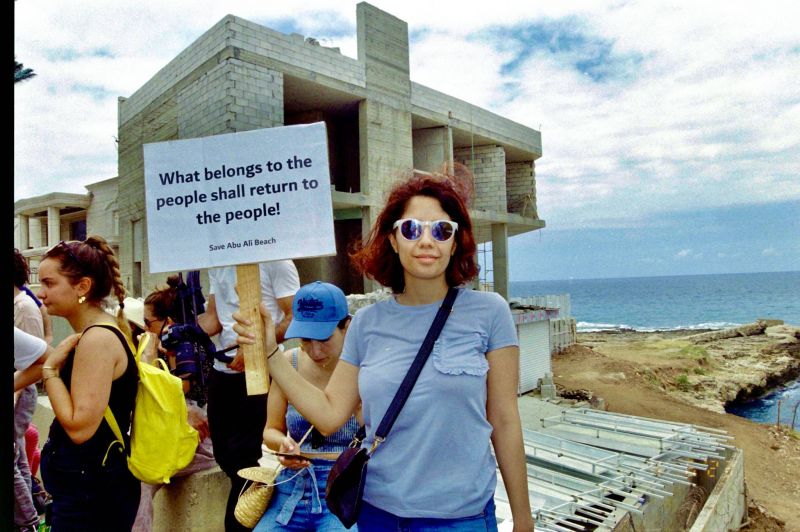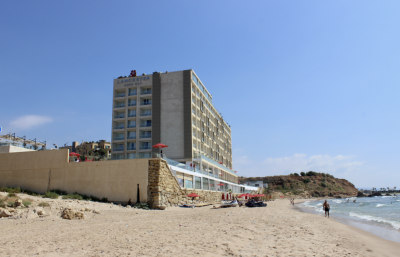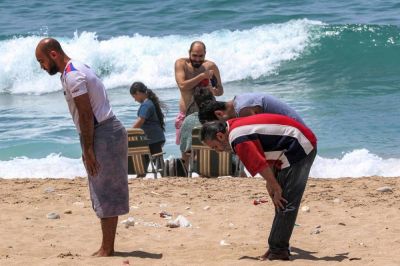
A protester at the Kfar Abida beach. (Credit: Angela Khalife/L'Orient-Le Jour)
“It’s completely illegal!” said Ahmad from beneath his placard. Indeed, a 1925 law enshrines Lebanon’s coast as public property.
“Look at this huge encroachment,” he said, gesturing to the charming Abou Ali beach in Kfar Abida, Batroun, where a large villa is under construction.
“You can see it clearly from here,” added the Abou Ali beach regular. ”There’s almost 5,000 square meters of encroachment, though it’s a public beach!”
Ahmad was among nearly a hundred people who rallied in Thoum for a march to neighboring Kfar Abida to protest the privatization of the coastline. To the rhythm of music that drowned out the sound of the waves, the small crowd attracted the attention of bathers and motorists alike.
“The marchers came from all over the country, from Beirut, Mount Lebanon and even the south,” said Joanna Hammour, deputy director of NAHNOO, one of the eight NGOs in the Coast for All coalition, which organized the march.
At the head of the march, the activist explained the reasons behind the rally. “There are more and more encroachments on our public beaches. It’s our right. It’s our land,” she said. “Yet politicians are buying up land adjacent to the beaches and restricting access, which is illegal.”
Demonstrators walked along the coastal road at a relaxed pace. It is an effective way of pointing out the sites where the latest violations have taken place.
It’s impossible to avoid the seaside construction sites, particularly on Abou Ali beach, in Kfar Abida, where demonstrators stopped for a long time. Here, access is entirely impeded by rusty metal barriers that only allow a glimpse of piles of shovels and bags of gravel. The site seems abandoned.
Construction was permanently halted on June 5, said NAHNOO director Mohammad Ayoub, following a major campaign launched by the Beach is for All, which led to a court decision.
A video posted on social media June 6 shows excavators demolishing the illegal beach construction. Speaking to L’Orient-Le Jour, Kfar Abida mayor Tannous Feghali denied there was any construction along his coastline.
Feghali owns coastal properties, but the beaches adjacent to these properties, he claims, remain open to the public.
“It is not up to him to authorize access to the beach,” protested an outraged Ayoub. “It belongs to the public.”
When asked for the contact details of the owner of a large complex currently under construction in his locality, Thoum mayor Tannous Aoun was evasive.
‘Where’s the beach? I can’t see it’
According to participants in the coalition, Sunday’s march was the group’s best option for raising awareness and reclaiming public beaches.
“Marching allows all the encroachments to be highlighted,” said a 28-year-old doctoral student who joined the movement and is accustomed to going to the public beach with her friends. “It shows that the protest isn’t directed at a particular person or project, but at all coastal construction.”
Although the path taken by the organizers runs along the coast, the sea is barely perceptible during the walk. “The buildings are blocking the view!” said Péguy, a septuagenarian. Access to the public beach for Péguy and everyone else often entails crossing paths lined with barbed wire and taking steep staircases to reach the seaside.
“Today, as a Lebanese, if you want to see the sea, you have to be at the top of a staircase or high up,” said one of two circus performers who came to the march on stilts.
“Where is the beach?” this demonstrator’s placard read. “I can’t see it!”
Also among the marchers were parents with young children, as well as a smattering of teenagers from Abrin, a village on the outskirts of Batroun.
Those who swim regularly at Abou Ali beach are between 13 and 16 years old, but this is not their first demonstration. “Our whole village and those neighboring us are mobilized,” said a youngster. “When it comes to campaigning for our beaches, we answer the call.”
Social and ecological consequences
Illegal privatizations make it almost impossible for local residents to access the beaches. It costs between $15 and $20 to access one of these private beaches. Paola Rebeiz, a longtime activist with NAHNOO, denounced these prices.
“The coast is free,” she said. ”We should all have access to it. Under no circumstances should beaches be privatized. It’s theft!”
The demonstrators also highlighted the impact on the tourism sector, suggesting that high prices drive away holidaymakers. “These beaches are Lebanon’s tourist front, and if we cover them up, there’ll be nothing to encourage tourists to come,” said a protester.
Then there’s the ecological price. “Buildings, restaurants … are a source of pollution,” Hammour said.
“The issue of sewage is crucial. It’s not the first time it’s been discharged untreated into the water, especially those connected to establishments,” said a member of Lebanon Eco Movement, a network of environmental NGOs, who asked to remain anonymous.
Microphone in hand, Mohammad Ayoub leads the march to its destination, Abou Ali beach. For him, the success of the action on this site could change things.
“I’m hopeful! We’ve already managed to stop two privatization projects, including one at Abou Ali. As a result, construction on these beaches has stopped.”
Ayoub remains cautious, despite these two victories.
This article was originally published in French in L'Orient-Le Jour. Translation by Joelle El Khoury.


